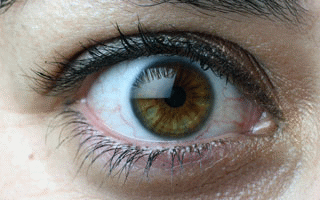| |
Nystagmus
Nystagmus is the name for a condition
where the eyes move rapidly and out of control. There are three
kinds of nystagmus which are named after the kind of movement.
» Horizontal Nystagmus
The
movement of the eyes from side to side. |
» Vertical Nystagmus
The
movement of the eyes up and down. |
» Rotary Nystagmus
The
movement of the eyes in circles. |
Nystagmus can affect one or both of the eyes. Nystagmus
usually results in some visual impairment, but the amount of
visual impairment varies from person to person. |
 |
Causes
There are different ways to talk
about nystagmus based on when and how the condition is acquired.
Congenital nystagmus is present in a person from birth. The eyes swing
from side to side and do not work together well.
Infantile
nystagmus is also present early on. This kind of nystagmus appears
within the first two or three months of life. It may be caused by
underdeveloped connections between the eye and the brain.
•
Manifest nystagmus means the nystagmus is present all of the time.
• Latent nystagmus means the nystagmus is made worse when one
eye is covered.
• Manifest-latent nystagmus is a condition
where the nystagmus is always present, but is also made worse when one
eye is covered.
• Acquired nystagmus occurs later in life,
usually as a result of another illness, an injury or as a reaction to
medication.
You can also talk about nystagmus based on the
cause of the condition. When defining nystagmus based on the cause of
the condition, there are two types of nystagmus.
• Optokinetic nystagmus is caused
by problems in the eyes.
• Vestibular nystagmus is
caused by problems in the inner ear.
Some causes
associated with nystagmus are heredity, albinism, eye disorders
like cataracts or strabismus, injury to the head, the use of
certain medications, alcohol or drug use, multiple sclerosis,
thiamine deficiency and central nervous system diseases. |
 |
Often a person with nystagmus will tilt their head to improve their
field of vision. This allows both their eyes to look to one side,
minimizing the effects of nystagmus on their vision. The point at which
a person’s nystagmus is the least noticeable is known as the “null
point”. A person with nystagmus may position their head so that they are
always seeing the world from this null point, their point for the best
vision possible.
Diagnosis
Diagnosis of nystagmus can be made with a comprehensive eye exam. By
going over the patient’s history, measuring the eyes and testing how the
eyes move and work together, a doctor can make a diagnosis of nystagmus.
Nystagmus affects everyone’s vision differently. For example, a child
with nystagmus may not notice any shakiness in their vision, while an
adult with different reasons for their nystagmus may have shakiness
impair their vision.
If the reasons for the nystagmus are
suspected to be neurological, a CT scan or MRI scan may be necessary.
Your doctor may decide your nystagmus is a result of another underlying
medical condition and refer you to a professional for a diagnosis.
Prevention
There are no known ways to prevent nystagmus.
Treatment
Treatment for nystagmus depends on the kind of
nystagmus present.
There is no cure for nystagmus. However, when the
underlying medical conditions that are causing it are treated, nystagmus
can be greatly reduced. People with nystagmus can and should still use
glasses or contacts to correct other issues with their vision.
Using books with large print, working in good lighting conditions and
finding the optimal head position to reduce nystagmus can all help
minimize the effects of nystagmus.
Advanced
Treatment
In some rare cases, surgery may be recommended to reposition the muscles
of the eye. This does not cure nystagmus but may reduce the amount of
head tilting needed to reach optimal vision in a person with nystagmus.
Botox can also be used to temporarily reduce the amount of
involuntary movement in the eyes.
When to see a
medical professional
Symptoms of nystagmus include:
sensitivity to light, holding the head at an angle, tilting the head,
shakiness of vision, dizziness and difficulty seeing in darkness. If you
experience any of these symptoms, you should see an eye doctor
immediately.
Always see a medical professional immediately if you
have any sudden changes in vision. This includes darkening around the
edges of your vision, dark spots in front of your eyes, halos around
bright lights, a loss of vision in one part of your field of sight or
any other noticeable change.
For more information, go the
American Nystagmus
Network
|
| |
|